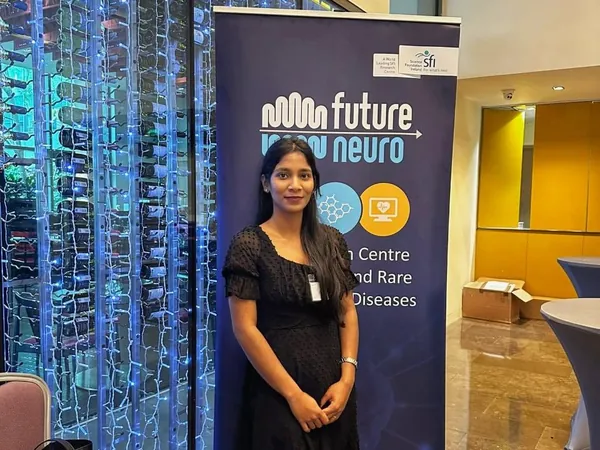
Groundbreaking Research: UCD Scientist Targets Epilepsy with Innovative Approaches
2025-03-25
Author: Sarah
Groundbreaking Research: UCD Scientist Targets Epilepsy with Innovative Approaches
In a move that could redefine epilepsy treatment, Sujithra Srinivas, a PhD researcher at University College Dublin, is diving deep into the complex world of brain science with the aim of developing targeted interventions for this pervasive neurological disorder. With over 50 million people affected globally, epilepsy represents one of the most widespread neurological conditions, prompting urgency in the search for effective therapies.
Under the mentorship of Dr. Gary Brennan at the FutureNeuro Research Ireland Centre for Translational Brain Science, Srinivas is committed to revolutionizing the current methodology of treating epilepsy, particularly for the 30% of patients who experience drug-resistant seizures. Traditional antiepileptic drugs typically focus on suppressing symptoms rather than targeting the fundamental molecular mechanisms causing the disorder, an aspect she seeks to change.
Srinivas’ research revolves around the intriguing N6-methyladenosine (m6A), a prevalent RNA modification linked to post-transcriptional gene regulation. Current hypotheses suggest that enhancing m6A levels by inhibiting the demethylase enzyme could yield promising outcomes in treating epilepsy. "This could mark a new avenue for therapy that not only alleviates seizures but also addresses the root cause of the condition, potentially altering its course," Srinivas explains.
Moreover, her efforts extend beyond the laboratory. Through outreach initiatives such as the ‘Cut from the Same Cloth’ project, Srinivas fosters community engagement by connecting personal experiences with scientific explorations. This project aims to draw parallels between the intricate patterns found in textiles and the complex structures integral to neuroscience, emphasizing the human aspect of her work.
Despite the exciting potential of her research, Srinivas faces significant hurdles. Funding for innovative but risky research is often scarce, as traditional funding models favor projects with immediate commercial viability, leaving many groundbreaking studies underfunded. Additionally, she highlights the persistent challenges of gender bias and underrepresentation in STEM fields. These systemic barriers limit opportunities for women and marginalized groups, calling for a collective effort in fostering diversity within the scientific community.
Srinivas emphasizes the importance of public engagement with science, especially in light of recent global crises such as the Covid-19 pandemic, which has enhanced the visibility of scientific discourse. "People are increasingly aware of how science affects their lives, yet we must address the growing politicization of scientific matters to ensure clear and objective communication," she notes.
Her dedication to advancing our understanding of epilepsy and the broader neurological landscape showcases the pivotal role researchers like Sujithra Srinivas play in shaping the future of health sciences. With her innovative approaches and community-focused initiatives, she not only aims to transform treatment possibilities for epilepsy but also to inspire a new generation of scientists committed to impactful research.
Stay tuned—Srinivas’ path may very well lead us towards a revolutionary breakthrough in epilepsy management!
 Brasil (PT)
Brasil (PT)
 Canada (EN)
Canada (EN)
 Chile (ES)
Chile (ES)
 Česko (CS)
Česko (CS)
 대한민국 (KO)
대한민국 (KO)
 España (ES)
España (ES)
 France (FR)
France (FR)
 Hong Kong (EN)
Hong Kong (EN)
 Italia (IT)
Italia (IT)
 日本 (JA)
日本 (JA)
 Magyarország (HU)
Magyarország (HU)
 Norge (NO)
Norge (NO)
 Polska (PL)
Polska (PL)
 Schweiz (DE)
Schweiz (DE)
 Singapore (EN)
Singapore (EN)
 Sverige (SV)
Sverige (SV)
 Suomi (FI)
Suomi (FI)
 Türkiye (TR)
Türkiye (TR)
 الإمارات العربية المتحدة (AR)
الإمارات العربية المتحدة (AR)